Actually, I love breaking that to you. Truth and transparency will always be better in the long run than shame and secrecy. How could it be otherwise? How could we be more afraid of the truth than of lies?
At least truth is… you know… true.
Earlier this week The Adopted Ones (TAO) highlighted an article about adoptees who use DNA testing to scratch the itch of wanting to know their ancestry — like so many people do. Genealogy has been called America’s fastest growing hobby.

TAO is reacting to an article about how DNA testing is changing the world of adoption, which she found on an adoption agency site. She chose not to link to it, and neither will I. This agency isn’t unique and it isn’t the problem. It’s just indicative of the problem, so pitchforks won’t help. But perhaps you can get the gist from these screenshots.
And it you can’t, no biggie. You can get what you need from reading TAO’s post.
DNA Testing: Secrets No Longer Stay Secret
The gist of the article is that when adoptees search using DNA testing results and the webs of connection that are ever-growing, unsuspecting families can be sent into a state of disarray due to the truth coming out.
It’s understandable that through such a public-facing page, an adoption agency would need to appeal to expectant moms as consumers of their services, and also to adopting parents as (paying) customers of their services.
But when they do this, they too often don’t factor in an adoptee viewpoint. That’s why you should read what TAO has to say about it.
“Closed Adoptions Still Exist”
Back to agencies like this one, dragging itself out of the dark ages of adoption (you know, the good old days of Georgia Tann and Louise Wise doing whatever they wanted to vulnerable humans because no one knew what they were doing behind closed doors).
You’d think that in 2021, when addressing the myriad fears either expectant parents or adopting parents might come to the table with, the agency would educate and advocate for openness, for truth and transparency.
But instead, this one, like others, continues to frame secrecy as a viable option.
Open adoption is becoming more and more common; however, closed adoptions still exist.
— Adoption agency, sourced June 2021
No Longer Such a Thing as Closed Adoption
I’m not debating whether closed adoption SHOULD still be a viable option. I’ve written perhaps 200 posts here making the case that closedness ends up NOT being better. Not for the adoptee (an information void can have serious medical and emotional consequences), not for the adoptive parents (it can perpetuate Either/Or thinking and lead to brittleness and inhibiting connection with the child), and not for birth parents (living under oppressive shame and not processing grief can be really hard on one’s emotional health).
I’m declaring the obvious: that closed adoption simply ISN’T a viable option. There is no longer such a thing as closed adoption.
Closed Adoption is Dead. Good Riddance
Twin forces of the 21st century — webs of connection facilitated by social media and scientific advances in genetics — have shuttered the days of closed adoption. No longer can anyone — not even those involved in an international adoption — be assured secrecy and anonymity.
We’d be better off figuring how to to deal with What Is than to try to run from What Is. Those facilitating adoptions should know better.
With DNA + social media, everything can be found out. Every ONE can be found out.
The implications are huge.
“The era of family secrets is truly over…”
States that still seal original birth certificates from adoptees have yet to realize that not offering a legitimate method of getting what others can get will lead many of them to use other means. The best option available to a curious adopted person in a sealed-records state is DNA testing, and then subsequently reaching out to far-flung relatives to piece together the earliest chapters of their life story.
Some legislators are concerned that opening birth records would lead to “outing” formerly cloaked birth parents. But how about instead of the “horror” of records being opened, a birth parent is contacted by a third cousin’s grandson to find out if a distant match on Ancestry means there’s a new (old) brother/sister/cousin on the scene? Someone would have some ‘splainin’ to do — in a not-so-private way. Instead of it being a private matter, it’s in the hands of random family members on Ancestry. Or 23AndMe. Or any of the others that are connecting people in unexpected ways.
Think I’m being dramatic? Libby Copeland, author of The Lost Family, said in a tweet series this morning that almost the entire country has opted in to DNA testing.
Which means that almost the entire country is effectively opted in, because of our shared genetic segments and our shared lives. The era of family secrets is truly over – and the era of intergenerational reckoning has begun.
— Libby Copeland, author of The Lost Family (@libbycopeland) June 2, 2021
“…and the era of intergenerational reckoning has begun.”
As Massachusetts and other states are figuring out, “protecting the privacy of parents who surrendered their children for adoption” is a misguided and futile endeavor. Instead, how about we deal with What Is and eliminate the need for reckoning.
“If a birth parent wishes to remain anonymous via closed adoption, he or she can make that clear through the terms of the adoption.”
— Same adoption agency, sourced June 2021
TAO closes her post: “Adoption World would be well-served if it simply refused total secrecy, a secrecy that wasn’t part of adoption until well into the last century. Let’s all work to promote openness when an adoption must happen in the best interests of the one being adopted.”
I agree. Do you?
More Timely Confirmation that Closed Adoption is Dead
- Time magazine‘s article Baby Brokers, released June 3. Corruption, coercion, and preying on the vulnerable can happen when no one is watching. Read this well-researched article and watch the video for even more reasons why closed adoption should be dead.
- PsychCentral‘s Inside Mental Health Podcast. In a June 3 episode called Is Open Adoption Psychologically Healthy? Dawn Friedman, MSEd and Adoptive Mom, is asked why choose open adoption when closed adoption sounds so much easier. Dawn’s answer includes this quote: “The era of closed adoption is closed….parents need to wrap their heads around this.”
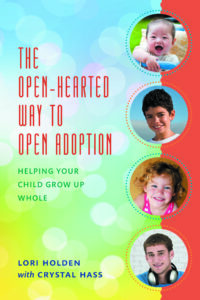
Lori Holden, mom of a young adult daughter and a young adult son, writes from Denver. She was honored as an Angel in Adoption® by the Congressional Coalition on Adoption Institute.
Her first book, The Open-Hearted Way to Open Adoption: Helping Your Child Grow Up Whole, makes a thoughtful anytime gift for the adoptive families in your life. Her second book, Standing Room Only: How to Be THAT Yoga Teacher is now available in paperback, and her third book, Adoption Unfiltered, is now available through your favorite bookseller!
Find Lori’s books on her Amazon Author page and catch episodes of Adoption: The Long View wherever you get your podcasts.



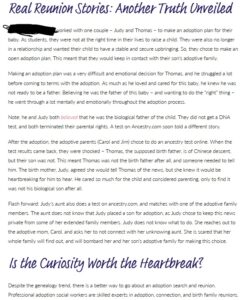
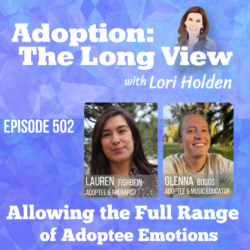
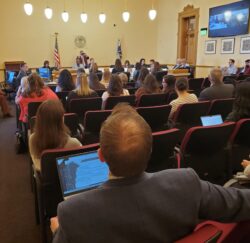
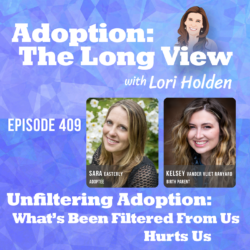

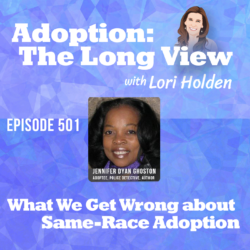

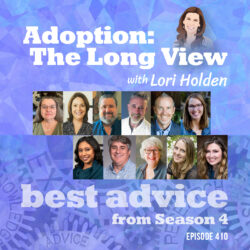
11 Responses
Rrrrr. The majority of reasons to keep adoptions secret is so the underhanded coercion, lies and threats in adoption are not disclosed. The shame in single parenting is hat which pro baby theft proponents facilitate.
I’m sure that is a factor at some agencies.
More truth, less shame.
I was raised with, “there’s nothing to be ashamed of, but don’t tell anyone”.
So much damage was done by trying to keep our identities a secret. Our family would have been much healthier if we had been able to face the truth about adoption. I’m still paying the price today.
What a mixed message!
I agree with you about facing the truth leading to healthier outcomes. I’m sorry you were left to pay the price. That’s wrong.
We just watched a season of Long Lost Family, and it was clear that so many people just need to know where they came from. It was also clear that the DNA databases are a good source of that information. Diligent investigators will show up at your door, so it’s best to adjust to that idea before it happens. Obviously, Long Lost Family is sanitized for TV, but it still gives a great overview of how people with a bit of information and a DNA kit can find connections.
Such a good point to get ahead of it. Because you can no longer assume it won’t happen. Truths come out.
You’re right, with DNA testing & genetic genealogy, it’s going to be pretty hard to keep secrets in today’s world.
On a somewhat related note, I caught the tail end of a documentary on CBC News Network last night called “The World’s Biggest Family,” about one man (filmmaker Barry Stevens)’s discovery that he was born from donor sperm — and that he might have up to 600 (!!) half-siblings. He meets up with some of them at a pub in Britain. I’ve seen some of Stevens’s previous films on the same subject, and may go online to watch this one in its entirety. He is pro-disclosure and openness re: donor gametes.
Fascinating! I’m so glad to hear he’s pro disclosure regarding donor gametes. Like adoption, secrets are not guaranteed to stay secret. And like A said, it’s not good to have your head in the sand.
One should not expect secrecy and if adoptive parents were promised it years ago, it might not survive new technology. The old method of changing the adopted child’s name, fake life stories, and sealing birth records was enough to give good adoption secrecy in the pre-internet era. But this method could not hold up when confronted with new technologies like social media, DNA searches, ancestry searches, search engines, online directories, and GPS map guidance apps.
Now as the result, it is near impossible to completely close adoptions. As the result, adopted and foster children need to know their true life stories, understand the challenges their birth parents to faced and why they could not raise them. I think as they get to their teen years, adoptive parents will need to accept that some of them will trace their birth parents and how to support their child in answering questions or facilitating a visit or a reunion, regardless of their age. Secrecy till age 18 will become a thing of the past and future adoption agreements should not guarantee secrecy at all.
👏🏼
Remember some more things. DNA Searches can reveal:
* Siblings of persons who grew up in foster care and/or were adopted
* Birth Parents of children who are in foster care or were adopted
* Birth Parents of children switched at birth accidentally
* Relatives in the witness protection program
* Severed branches of family due to past lovers, failed relationships, criminals, and other “family secrets”
* Long lost relatives
*Birth Relatives of international adoptees
Warning: Do not do a DNA search unless you are prepared for 100% Honesty!
What I recommend people do instead:
1) Realize that foster and adoption secrecy is no more. Even if you were promised the confidentiality of a closed adoption years ago, that confidentiality may not survive new technology.
2) Educate foster and adopted children about their real life stories. Remember they need to know who from their past is safe and the real reason they were separated from their original families. You cannot tell someone that their parent was a nice person when in reality they were a criminal or a sexual predator now. Kids need to know using age appropriate vocabulary. False information can lead to horrible results as the result of a search by a child can reveal someone very different that what the child was told.
3) Remember that a child’s level of computer skills will usually increase as they go through childhood, and the technical skills of an average high school student is closer to that of a young adult rather than a baby. By the time someone is a teen they may have the ability to start a social media or other search for their past.
4) Remember a child’s long term memory does not get erased when they are moved into foster care or are adopted. The older a child is when separated, the more likely that they may remember identifying information about their birth family from their past.
5) Once a foster or adopted child or teen makes contact with a birth relative or sibling, they may need emotional support and likely they will get a say in the contact arrangements going forward, at least from a technical sense. Do not expect 100% adult control of contact once a child or teenager connects using a non-letterbox form (such as social media, email, video conferencing, text messaging, or phone). It is best to help the child manage this rather than immediately jump into a panic or punishment mentality.
6) Once identifying information is in the child’s long term memory, it can be very difficult to reverse and you will not get adult control of contact back real easily, and it is very likely that the child’s contact will not be mediated from this point going forward.
7) Remember that post-adoption support is available if a child encounters an uncomfortable situation when reconnecting with a previous relative.
8) Know what recourse options you have if digital contact becomes pushy or abusive, such as:
* Changing the child’s privacy settings on social media
* Blocking the relatives phone calls or texts
* Changing the child’s phone number or email address
* Blocking the relative on social media
* Deleting the child’s social media profile
* Seeking a restraining order
* Moving
Each of these restores a different level of privacy but none fully clear the identifying information from the child’s long term memory.
To clear photos or videos stored offline, this will require physical access to the computer, cell phone, hard drive, flash drive, or CD/DVD/BD-ROM that stores them.
9) Realize that you can set up supervised contact if needed in some cases if needed for higher risk relatives.
10) Be open to talking to your foster or adopted child about these kinds of issues and build a strong bond to them, and support their decision to search if desired. Such a bond will reduce the chance of a adoption breakdown.